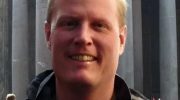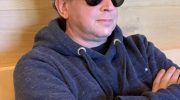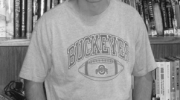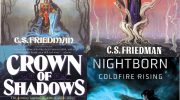
The need to write led Jason LaPier to create worlds and characters that are getting readers and reviewers talking. With multiple writing competition successes under his belt, a growing collection of books, and many more stories to tell, this multi-genre author is definitely one to watch!
Bio:
Born and raised in Upstate New York, Jason LaPier lives in Portland, Oregon with his wife and a couple of dachshunds. In past lives he has been a guitar player for a metal band, a drum-n-bass DJ, a record store owner, a game developer, and an IT consultant. These days he divides his time between writing fiction and developing software, and doing Oregonian things like gardening, hiking, and drinking microbrew.
It’s great to have you here on SFFWorld.com, Jason. Diving right in, how do you achieve the kind of world-building that gets people talking?
I think what’s most important is creating a world that serves the story you want to tell. I wanted Unexpected Rain to be a murder mystery at its heart, and that meant building a universe that was sci-fi and at the same time, a good place for a noir style of storytelling and plot. So when I was thinking about power structures – government, corporate, police, military, etc – I didn’t want to go with the common setups you find in space operas, such as imperial rule, or a bunch of clearly-divided factions. I needed more ambiguity around power; I needed structures that are ripe for corruption and confusion. And then I added to that cultures of complacency and apathy, which make great hiding places for the subversive.
 Unexpected Rain was well-received by critics and fans, are you worried about what the reception will be like for its sequel Unclear Skies.
Unexpected Rain was well-received by critics and fans, are you worried about what the reception will be like for its sequel Unclear Skies.
Yes! Every waking moment! And then I take a breath, take a drink, and calm down. I remind myself that I had a lot of fun writing it. And I think I stayed true to the aspects of the first book that appealed to readers. I’m hard at work on the third book right now, so I really hope readers like the second one!
What can fans expect more—or less of—in this much-anticipated follow-up?
The first book introduced Jax, the life-support operator who is accused of murder, and Runstom, the rogue cop that believes Jax is innocent. It also introduced Dava, a sometimes-fiery, sometimes-icy assassin that works for a criminal outfit called Space Waste. In the first book, Dava and Space Waste are kind of wildcards: something extra for Jax, Runstom, and the rest of the police have to deal with. A lot of my readers loved Dava and I grew attached to her as well, and so in the second book, Runstom and Jax will return, but they will make a little room for Dava, who I’m happy to say gets equal page time. Space Waste as an organization – though still perceived as a wildcard by some – reveal more of their focus, drive, and grand plans.
One of the more selfish reasons I was excited about this interview, is because the main character is called “Jax” (my nickname). How did the details of his life come to you?
As a writer, it’s dangerous to go down a path of creating a character that’s too much like yourself, and I tried to avoid that with Jax, but I’m not sure I was entirely successful. In a lot of ways, Jax is inspired by the low points of my life and my attitude: those times when I knew I could be doing something better with myself, but I was defiantly sabotaging my own success and my relationships with the forces of insecurity, bitterness, procrastination, and good ol’ apathy. So yes, in some ways Jax is designed to be the most mediocre version of myself, someone whose life I just wanted to grab and shake with both hands, someone I could force into a change-or-die situation. Likewise, I love the idea of a character who comes off as brilliantly intelligent at times, and an incredibly ignorant, poor-decision-maker at other times. These traits are definitely inspired by myself and my co-workers in technology professions!
What do you draw inspiration from and, are you one of those lucky writers that whole plots come via dreams?
Great artists steal! I used to worry about being labeled as “derivative”, but I eventually got over it. Every story is unique, even when it “has the same plot as X” or “has a character Y that is just like some other character Z”. So I’m not ashamed to admit, the universe of The Dome Trilogy is heavily inspired by the TV series Firefly. And I owe a great debt to sci-fi writers like Isaac Asimov, who first proved you can mix mystery and sci-fi with The Caves of Steel, and Philip K. Dick who brought that noir dark atmosphere into a lot of his stories. And when it comes to authors that made me want to be an author, I’m hugely inspired by Douglas Adams, Neal Stephenson, and William Gibson. I wish I could write as ridiculously as Adams, but instead I’m content to inject a little humor now and then, along with a healthy dose of cynicism.
 As someone who originally saw writing as a hobby, were you shocked when Unexpected Rain was picked up by major publisher Harper Voyager?
As someone who originally saw writing as a hobby, were you shocked when Unexpected Rain was picked up by major publisher Harper Voyager?
By the time it happened, I was spending a significant amount of time with this “hobby”, and I think I just needed the kick in the head to know it wasn’t really a hobby any more. It might not have been a profession, but it was becoming an obsession.
Still, I must confess, it was a complete shock. Truth be told, I’d sent my manuscript to HarperVoyager long ago and had accepted the fact that silence meant rejection. When the email came, I was … confused. After the tenth time I read it, it sank in. Then I was walking on air.
Have you ever considered self-publishing? Why/why not?
Yes, actually, I have a number of friends who self-publish and have been successful with it. It requires a lot of work. Writing and editing a novel is already a huge amount of work, and in today’s day, a newer author like me has to do a lot of their own publicity work to supplement anything the publisher does. But in self-publishing, you really are doing everything. The most successful self-pubbed authors I know will tell you that you have to be willing to shell out the cash to pay for an editor (or editors, because you’ll need developmental editing help as well as copyediting), cover designer, and publicist. And you basically become a project manager at that point. It sounds daunting, but the advantage is that you have full control of the process. I’m not ruling it out of my future, and in fact I know a few authors that are “hybrids” these days: they may have a few books with a publisher, but they self-publish a few of their own, especially the odd stories that are harder to market and harder to get publishers to take a risk on.
You’re currently seeking representation for your “modern-day speculative fiction thriller” Crossfade. Why have you chosen to go with an agent for this book?
That’s a great question. I am sincerely grateful to HarperVoyager for giving me an opportunity by taking my manuscript for Unexpected Rain without going through an agent. However, an author’s relationship with a publisher is a business one, and though I’m not unhappy with the contract I have, I know an agent can do a lot of things I wouldn’t have thought of – like securing non-English publishing rights so they can be re-sold to foreign publishers, for example.
But there’s something else that I should admit: I really, really like Crossfade. I put a lot of heart and sweat into that book. I want to give it the best shot it has at being successful, and I need someone in my corner to help me do that.
Who are your biggest cheerleaders? Your wife or the Dachshunds?
Ha, those dogs are so lazy! But yeah … my wife and I have been married for almost eight years now. We support each other in all aspects of our lives. She is an artist, so while she cheers on my writing, I cheer on her painting and pottery work.
We both understand the creative process, which involves a lot of experimentation and throwaway work, and can be frustrating. It takes a lot of mistakes to make art. Having a partner who understands that and can remind you of that is a blessing.
You talk about having to make time for family and that it’s not always easy. What’s one of your “life hacks” for ensuring you do?
Interesting question … I hadn’t really thought about this as a “hack”, but I suppose it is: memberships. We’re members of the Portland Japanese Garden, the Portland Art Museum, the Hollywood Theatre, stuff like that. Since we have memberships, we have to use them or we’re wasting our money! But these are the perfect spots for those weekends when we don’t have something else planned and we just need to spend some time together – and get out of the house, get out of our ruts.
From metal band to record store owner, it’s obvious that music has been a major part of your life. Is it still, and do you listen to music while writing?
Absolutely. I feel really bad for some of my writer friends who say they can’t write with music because it distracts them, because I hate writing without music. Silence is distracting! These days I have a wide range of musical tastes that I draw upon when I’m writing, depending on whether I’m looking for something moody and atmospheric, something uplifting, something angry and punchy, or something that just gets me moving.
At any given time what’s in your playlist?
I still listen to metal, and my tastes there go all over the place but tend to gravitate toward prog rock (Tool and Clutch have always been staples of mine) and heavier hardcore metal stuff (Sick of it All and any band influenced by them; in particular Vision of Disorder). Then on the electronica side, I’m into chill downtempo stuff, trip-hop, anything weird, and anything with a good beat: Boards of Canada, RJD2, Amon Tobin, Phantogram, Aphex Twin, and so on. When I’m writing, I’m not afraid to break out a good film soundtrack either, something to put me in a cinematic mood. My all-time favorite might be the stuff Clint Mansell did for the movie Moon. That music gives me brain tears.
Like the eclectic nature of the music you’ve worked with, the same is true of the genres you write. How do you choose a genre, or does it just kind of happen story to story?
Fiction is a place I can go to where the rules of the real world don’t apply. Where we make our own rules. It’s also a place where we can contemplate life’s mysteries, and explore choices and their consequences. And ultimately, what I get out of fiction is the reminder that the universe is a much bigger place than the small bit of the world I see on a day to day basis with my own eyes. This is a good reason that star-hopping sci-fi appeals to me. But expanding my worldview doesn’t have to come from imagining what it’s like to travel to another star system; it can come from imagining someone else’s life here on Earth. It can come from exploring situations, reactions, and emotions that I’ve never experienced. In a roundabout way: yes, I choose genre story to story, depending on what aspect of human life I want to dig into, or what kind of unexpected weirdness I’m trying to inflict on my characters.
You’re also a software engineer. Does this profession impact your writing in any way?
Sometimes, in a subject matter sense: when I write about technology, even fantastical futuristic technology, I love to consider the harsh realities of misinterpreted requirements, misguided interface design, rushed deadlines, unexpected uses, inexplicable gremlins, and just plain ol pain-in-the-ass bugs that I encounter in my present-day reality. Software is in everything today, and will be even more pervasive in the future. Software engineers (like me) get stuff wrong all the time and I find it funny that buggy software rarely comes up in science fiction.
In a more general sense, I have noticed a lot of similarities between my approaches to writing fiction and writing code. There’s the brainstorming phase: the experimenting, hacking around with ideas. Then the big picture phase, where you start to design in broad strokes what the story or the feature is going to look like, how it’s going to move from beginning to end. Once the overall design has taken shape, it can be broken down into pieces that can be tackled individually, to get a draft of the story or the code. And naturally, no matter how hard I plan, something always changes during the process: working through one problem gives me an idea about another, or changes the way things will work down the line. This is analogous to a plot point or a bit of character development that arises suddenly and affects the rest of the storyline in a way I hadn’t planned for. In both cases, I’ve come to accept that revision is part of the process. This is not natural to the engineer’s mind: we like to think that it’s all math and formulas and there’s correct answer for everything, but this is never the case. Just like beginning authors imagine that a story can be written all in one go, that a first draft should come out perfect. Through my experience in my profession and my writing, I’ve embraced the notion that nothing works right the first time.
Since beginning your writing journey, what would you say is the most prominent discovery you’ve made about yourself?
That I need writing to survive. Stepping back, I think I’ve always needed a creative outlet to keep me going from day to day. For a long time, music sated that part of me. But as much as I loved expressing myself through music, I found even more enjoyment from creating worlds and expressing myself through the written word. I love my job as a software engineer, because the challenges and the opportunities are exciting, but even though it requires a level of creativity, there are still boundaries and limitations. Writing allows me to create without boundaries, to be limited only by my imagination.
It’s been great having you, thanks for joining us Jason!
You can find Jason online at http://jasonwlapier.com/ and @JasonWLaPier on Twitter.
*****
Interview by Jackie Jones – SFFWorld.com © 2016




